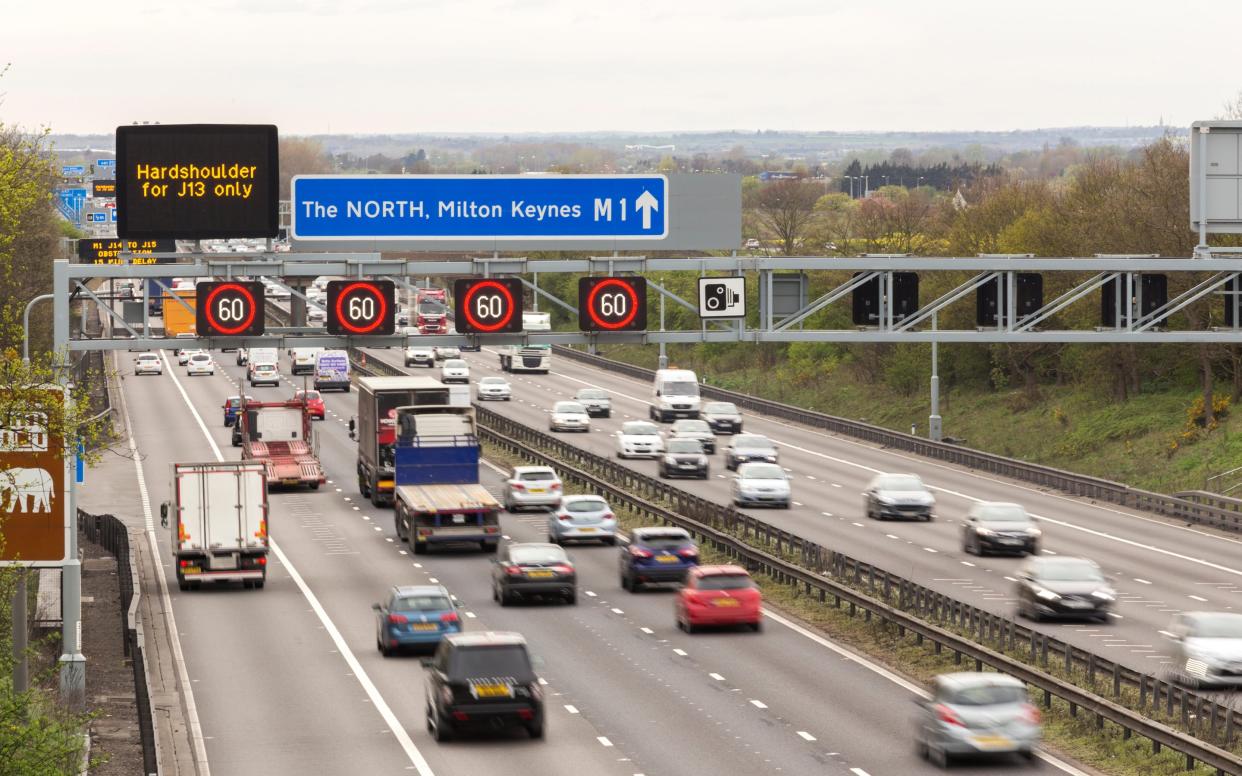Chief constable warned ministers and coroners to prepare for smart motorway deaths

A chief constable warned coroners and ministers that smart motorways would lead to more deaths if the hard shoulder was scrapped, a letter obtained by The Telegraph shows.
In December 2013, David Crompton, the then chief constable of South Yorkshire Police, warned how plans to “upgrade” the M1 would “increase the risk both to the public” and “contribute towards death or serious injury.”
He cited Highways England’s own prediction of a 200 per cent increase in cars stranded in live lanes as “proof” about his concerns.
Despite listing nine bullet points about why the M1 should keep its hard shoulder, the Department for Transport approved the proposals. The M1 opened as a four lane smart motorway in 2017.
Two years later the Telegraph revealed how four people were killed after their cars stopped in a live M1 lane before being hit by other vehicles across a stretch of the route.
The release of the letter, obtained under Freedom of Information laws, come as Grant Shapps, the Transport Secretary, is due to meet Highways England bosses to demand his 18-point plan meant to make smart motorways safer is “accelerated”.
He is expected to ask “tough questions” and demand a swifter rollout of technology capable of spotting stationary vehicles, a source said.

Earlier, a South Yorkshire coroner called for an urgent review into smart motorway safety after finding that scrapping the hard shoulders contributed to the M1 deaths of Jason Mercer, 44, and Alexandru Murgeanu, 22.
Next month, a pre-inquest hearing will be held in Doncaster into a similar fatal collision involving a stranded vehicle on that route.
Seven years ago, Mr Crompton took the “unusual step” of sending his letter to two Yorkshire coroners advising them to prepare for such cases.
He also expressed his exasperation with Highways England design team who knew of his concerns but “stipulated there are no design options available to reduce the risk”.
Explaining how his force wanted to work with the Highways Agency, as it was then, to make the M1 “fit for the future” he added: “Nevertheless, the managed motorway all lane running proposal presents foreseeable threats to the safety record of our motorways and operational challenges that will undermine the core objectives of the scheme (maximising capacity and supporting economic development).”
He added he understands it is a “complex issue … but the concerns of my force have not been satisfactorily resolved, and I feel it incumbent upon me to bring them to your attention.
“In summary, the proposals in their current format increase the risk to both the public and emergency responders, which at some point will, in our opinion, contribute towards death or serious injury on South Yorkshire’s motorway network.
Mr Crompton, who has since retired, wrote how he had received “assurances” from previous ministers that the creation of an M1 smart motorway would not go-ahead “unless the concerns of the relevant emergency services were addressed satisfactorily.”
He added: “To date the concerns of my force remain unresolved.”
He said he was worried emergency services would struggle “to reach the scene of a collision” if all four carriageways were blocked.
“This is a major issue in the event of motorists who may be suffering from life threatening injuries.”
The officer said he was concerned about the “frequency/size/identification” of Emergency Refuge Areas, the laybys shielded from traffic.
“The Highways Agency figures indicate there will be a 200 per cent increase in stationary vehicles in a live lane and this poses a significant risk to motorists and emergency responders,” he said.
A Department for Transport spokesman said: “Throughout the design and development of All Lane Running motorways, there was extensive consultation with the emergency services to ensure that they can quickly access those who have had an accident or have broken down.”
A Highways England spokeswoman insisted the “overall” risks for people on a smart motorway are lower, with the casualty rate having reduced 18 per cent.
“We know people are concerned about breaking down and we are determined to do all we can to make our roads as safe as possible,” she said. “We have already completed some of the actions set out in the Transport Secretary’s action plan. This includes installing more new technology which will detect if a vehicle has stopped in a live lane.”
She added while the hard shoulder is a place to stop in an emergency, there remains a risk to personal safety from doing so, with 100 casualties on the hard shoulder in 2017. Between 2014 and 2017 there were 27 fatalities on hard shoulders.
The unlikely campaigner
With her bright red hair and colourful tattoos, the former machine operator from Rotherham may at first seem an unlikely thorn in the side of an entire Government department.
But Claire Mercer, 44, has become a clear and consistent voice amid the growing opposition to the Department of Transport and Highways England’s determination to roll out smart motorways.
Born in London before moving North, she studied engineering, worked as a machine operator (a lathe miller and turner) before becoming a glass furnace buyer in Sheffield.
But, the youngest of four was repeatedly told by her mother, a proofreader, and her father, a printer, that she, like everyone else, was responsible for changing things that were wrong in the world.
“They said you have to fight to put things right,” she said.

In June 2019, that family philosophy was tested to the full when her 44-year-old husband, Jason, was killed on the M1 after he stopped following a minor bump to exchange details with another driver.
That day, Mrs Mercer was told by police her husband of 10 years had died on a stretch where the hard shoulder had been removed and technology installed meant to spot his stationary vehicle. It failed. It was the first time she ever heard the words ‘smart motorway’.
A few months later, Mrs Mercer - still visibly raw from her grief - spoke to The Sunday Telegraph to launch her campaign.
She gave up her job and for the last 17-months has worked tirelessly to change something she thought was fatally and irrevocably wrong.
“If there had been a hard shoulder, Jason and Alexandru Murgeanu, the young man from Romania involved in the prang, would both be alive today,” she said.
She has repeatedly turned to this newspaper to share details she has established scouring Hansard or engineering reports, or after filing Freedom of Information requests, and even messages made to her responses campaign website, Smart Motorways Kill.
What will bring an end to this campaign? She replied: “It’s very simple. Give us back the safety of the hard shoulder.”

 Yahoo Movies
Yahoo Movies 
